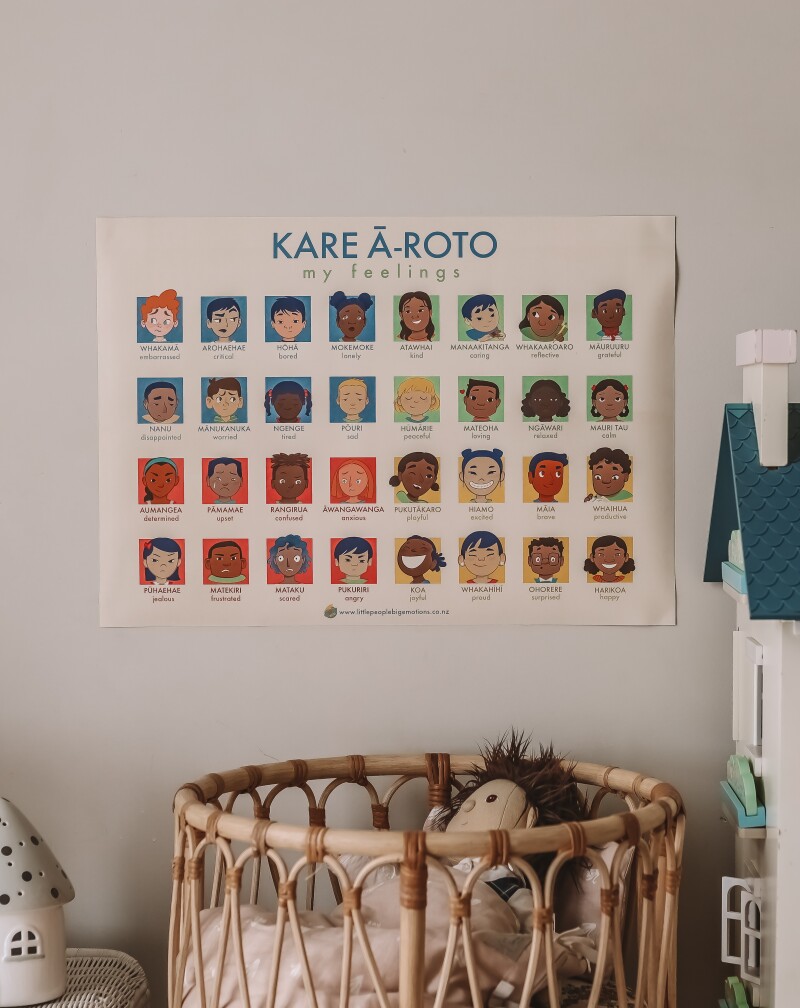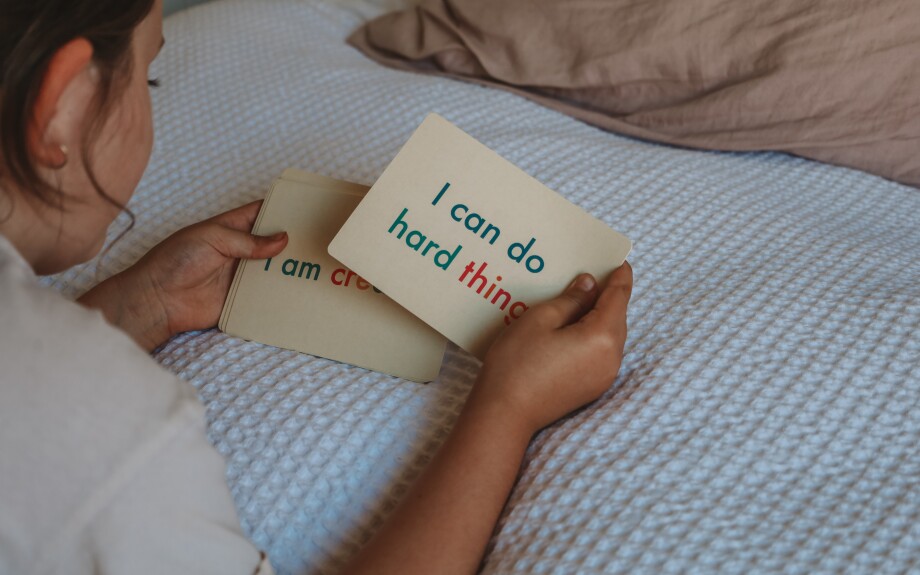When Renee White’s 18-month-old son, Eli, started having meltdowns and throwing tantrums, she was shocked—not by her toddler’s behavior, but by her own. Renee, who had always seen herself as a laid-back person, began to see a completely different side of herself as she struggled to stay calm and patient with her son. She was especially caught off guard by the things she would say to Eli in moments of frustration.
“I wouldn’t even have to think about it—words were just flying out of my mouth,” Renee says. “I was becoming so impatient, … and it all just felt so wrong.”
On one particularly difficult day, Renee reached the end of her rope, telling Eli that he was annoying and to leave her alone. These were things Renee had often been told as a child, and she had sworn to never speak that way to her own children.
“I was like, ‘Oh my gosh, I can’t believe I just said that,’” Renee says. “I never thought I would say that out loud to my child.”
After that painful turning point, Renee cried, gave Eli a hug, and promised herself she would do the work needed to become the parent she wanted to be. She spent the next two years studying all she could about child development, emotional intelligence, regulation skills, and parenting approaches.
What Renee learned has changed her family’s home in Geraldine, New Zealand, for the better—and has become her way to heed President Russell M. Nelson’s counsel in the April 2023 general conference: “How we speak to and about others at home, at church, at work, and online really matters. … I urge you to choose to be a peacemaker now and always.”
“Jesus Christ is the Prince of Peace, and when we have peace at home, it’s a lot easier for us to have the Spirit in our homes,” Renee says. “Making our home a place of peace and a holy place is a lifelong goal.”
Renee’s parenting journey hasn’t just made her own home a more peaceful place—she’s helping tens of thousands of other families across the globe reach the same goal. With the guiding hand of the Lord, she’s become a “peaceful parenting” advocate on social media and started a business that helps parents worldwide become more patient, more mindful, and more peaceful in their interactions with their children. And all along the way, Renee proudly shares her faith as a member of The Church of Jesus Christ of Latter-day Saints.
The Path to Peaceful Parenting
When Renee began studying different parenting styles, she discovered peaceful parenting. This approach focuses on understanding the needs behind a child’s behavior and forming a secure attachment between children and their parents or caregivers.
Genevieve Simperingham, the founder of the Peaceful Parent Institute, describes peaceful parenting as being “all about the connection between the child and the caregiver.”
“We look at the underlying feelings and the underlying needs of the child,” Genevieve says. “Rather than just making the child change the behavior regardless of what they’re feeling, regardless of what they’re needing, peaceful parenting is about decoding the behavior to give us clues into what they’re feeling and what they’re needing. Because when we meet those underlying feelings and needs, then the child gets to actually strengthen and develop those skills.”
A common misconception about peaceful parenting is that parents are permissive and allow children to do whatever they want. The opposite is true: parents set and hold clear, loving boundaries while also meeting their child’s needs with connection, empathy, and love.
“It really resonated, just being able to help my son understand that his feelings were OK to feel, but modeling and teaching him how to show those feelings in a healthy way,” Renee says. “I wanted more peace in our home, and I didn’t want contention.”
Renee felt so passionately about peaceful parenting that she decided to become a certified Peaceful Parent Instructor. She’s currently working through a year-long program in which she studies topics like discipline without punishment, defusing aggression, and mindful parenting. Genevieve has worked closely with Renee to help her become certified and has grown to adore her in the process.
“Renee really continues to put her heart and soul into her parenting,” Genevieve says. “She is the most beautiful, amazing, loving, committed soul. And she’s so brave to be sharing her struggles with other parents. … She’s just going to do amazing things.”
While Renee’s husband, Helaman White, was initially a bit skeptical of a gentler parenting approach, he’s seen the positive effects and now strives to be a peaceful parent as well. He’s proud of Renee for feeling strongly about parenting in a different way and then doing the work to put new principles into practice.
“You don’t only see the difference in how [Renee] behaves because of it, but you also see the fruits or the effects it has on our children as well,” Helaman says. “The way she parented seemed more Christlike, and she was able to control her emotions in a way that positively affected the way she parented.”
Peaceful Places
Thanks to Renee’s research and peaceful parenting training, she now feels confident in how she handles difficult moments with her children. Instead of yelling or losing her patience when her children are frustrated, overwhelmed, or angry, she now takes a moment to calm down and center herself. Then she takes her children to their peaceful place, a cozy spot in their home where Renee listens to her children and helps them identify what they’re feeling. They do a calming strategy together, which may be reading a book, taking a deep breath, or singing a song.

Even Renee’s daughter, who is only 18 months old, knows to go to the peaceful place when she’s having a hard time.
“She’ll literally run there and point to her feelings and then want to read a book with me,” Renee says. “She’s realizing, ‘Oh, I’m feeling upset,’ and she goes there and wants to connect with me.”
Renee came across calming corners early in her shift to more peaceful parenting. Calming corners are a cozy spot in the home where parents and children go together to calm down, identify their feelings, and find a calming strategy. After creating a calming corner, Renee quickly noticed that being with her son while he calmed down and teaching him healthy coping strategies was more effective than sending him to his room to calm down on his own.
She came across many American-based resources for creating calming corners, like posters with pictures depicting feelings and healthy coping strategies, but shipping was expensive, and she couldn’t find anything similar that she liked in New Zealand.
At that time, Renee was struggling with postnatal depression and had recently moved to a new town where she didn’t know anyone. To make matters worse, COVID-19 lockdowns were in full swing in New Zealand. Amid the loneliness and depression, Renee had been praying for more than a year for something she could do from home to earn an additional income and help her feelings of isolation.
When she came across calming corners and saw there was a need for resources in New Zealand, her prayers were answered. She had the thought to start her own business creating resources for calming corners, which she calls peaceful places.
“It was really the Holy Ghost,” Renee says of the idea to start a business. “I remember driving to pick up my husband from work, and. … and [I had] all these thoughts [in] my head about who I could contact, what [the resources] would look like, and all the different steps of what I needed to go through to get this to come to happen.”
After almost a year of hard work, miracles, and long nights, Little People, Big Emotions was born in October 2021, just six weeks before the birth of the White’s second child, a daughter they named Lyra. The mission of Little People, Big Emotions is “supporting [parents] on [their] journey in raising children who are caring, resilient, and emotionally strong.”
From colorful calming strategy posters to meaningful positive affirmation cards, her resources are used in more than 2,700 homes, schools, medical practices, and libraries in over 20 countries. In addition, Renee has almost 50,000 followers across her social media pages, where she shares practical, everyday tips to help parents create more peaceful homes and families.
“It is really so helpful to my mental health to be able to help other people,” Renee says. “It’s just been really, really heartwarming that way to see the positive impact that it has had in other people’s lives.”
Charlotte Karaka, a mother of two young children who lives in Gisborne, New Zealand, is one of those people. She discovered Renee’s content while struggling with the transition from one to two children and now uses Renee’s peaceful parenting techniques and resources in her home.
“The positive changes that I have seen in myself, my children, and my husband have been huge. Before this journey, we knew something wasn’t working, but we didn’t have the tools or experience to figure it out on our own,” Charlotte says. “Once I began using Renee’s resources and techniques, my husband noticed a shift in the mood in our home and slowly came on board after seeing such powerful results.”
Renee feels especially grateful to help fellow parents and children in New Zealand, which is facing a youth mental health crisis. It was important to her to make all her resources available in Te Reo Māori, the language spoken by the indigenous Māori population in New Zealand. Renee herself is from Dannevirke, New Zealand, and belongs to the Rangitāne tribe.
“There’s just so much intergenerational trauma in Māori because of colonization and a lot of other really horrible things that happened to Māori people,” Renee says. “I really wanted to make some resources that were available in Māori to be able to help in that way.”

Using Social Media for Good
Renee also shares her passion for peaceful parenting with parents around the world through social media. She regularly shares her own struggles and triumphs while raising children, what she’s learning in her peaceful parenting certification program, and encouragement for parents who are trying their best.
“Everyone has a different parenting journey, different backgrounds, different wounds to heal and more access to the support needed to heal those triggers,” she wrote in the caption of one TikTok that has been viewed one million times. “All we need to be doing is facing the right direction and trying our best every day to move a little bit closer to becoming the parent we want to be.”
Charlotte, one of Renee’s social media followers, appreciates Renee’s openness. Seeing Renee’s struggles helps her feel validated, since parenting still has challenging moments even while implementing peaceful parenting.
“All in all, I think the authenticity of Renee and her resourses are exactly what parents need,” Charlotte says. “They need to see someone who is real and raw so they too can be real and raw [with their children and] show [them] our emotions and model what we do to deal with them. It isn’t something many of us have seen modeled throughout previous generations, so it’s fantastic for our children to see our authenticity too.”
Renee also openly shares her faith and membership in The Church of Jesus Christ of Latter-day Saints with her social media followers. She says traditional member-missionary work is hard for her because of her struggles with social anxiety, but that sharing the gospel in natural ways online comes more easily. Recently, Renee was messaging a follower about how much prayer helps her in parenting. A few weeks later, she received a message from the follower, who was also a Latter-day Saint but who hadn’t been actively practicing, saying she had prayed for the first time in years.
“I’m really grateful that I can help bring other people to Christ in any way that I can,” Renee says. “But doing it in natural ways, I find, is the best way to do it for me.”
Parenting Is Spiritual Practice
Renee’s ancestors were some of the first Latter-day Saints in New Zealand, and her great-great-great-grandfather, Wiremu Takana, helped with the revision of the Book of Mormon into Māori and the translation of the Doctrine and Covenants and Pearl of Great Price. Renee received own testimony of the gospel after her mother died when Renee was just 14 years old.
“When my mom passed away, it was really hard on my family,” Renee says. “[It was] really challenging, but I came to know Jesus Christ and found a testimony.”
Renee would later serve in the California Anaheim mission before marrying her husband in the Hamilton New Zealand Temple. As they welcomed children to their family, their shared spiritual beliefs remain a huge focus in their parenting.

“[The gospel] is everything to us,” Renee says. “It’s a lifelong journey, but [I’m] really coming to know Jesus Christ more through being a parent.”
Renee views parenting as a partnership with God, and when she prays for her children, she asks God to bless “our son” and “our daughter.” Renee and Helaman strive to be patient, loving parents to help teach their children about the nature of God.
“Through parenting this way, I feel like my children will be able to come to know God as the gentle Father that He is, not the harsh, criticizing, finger-pointing God that a lot of us believe Him to be,” Renee says.
As she goes through the often monotonous daily tasks of motherhood, Renee reminds herself of Matthew 25:34–40, in which Jesus foretells His Second Coming and tells those on His right hand, “For I was an hungered, and ye gave me meat: I was thirsty, and ye gave me drink. … Naked, and ye clothed me: I was sick and ye visited me.”
When His followers ask when they did any of these things for the Savior, He replies saying, “Inasmuch as ye have done it unto one of the least of these my brethren, ye have done it unto me.”
“I’m doing that every day with my kids,” Renee says. “Through serving my children and being compassionate, getting them drinks, giving them breakfast, getting them dressed, being with them emotionally, and giving them that safe space [I believe] I’m serving God.”
To begin parenting more peacefully, Renee recommends starting with the 3 C’s: center, connect, and communicate. This is an approach recommended by the Peaceful Parenting Institute.
First, parents center themselves, taking care of their own unmet needs to more patiently and peacefully respond to their children. Genevieve, the founder of peaceful parenting, describes this step as finding a way to become present and “calm, cool, and collected.” Taking deep breaths, singing a favorite song, or saying a prayer can all help parents center themselves in moments of frustration.
Once parents have centered themselves, they can better connect with their children. “When our children feel connected to us, they’re actually able to hear what we’re saying,” Renee says. Getting down at a child’s eye level, listening to what they have to say, and validating their experience can all help parents and children connect.
And finally, once parents have centered themselves and connected with their children, they can communicate much more effectively with their children. “The communication always works better when there is connection,” Genevieve says. This is when parents can hold limits, make requests, or problem-solve with their children.
▶ You may also like: Do we unintentionally teach our kids that people can’t change?





